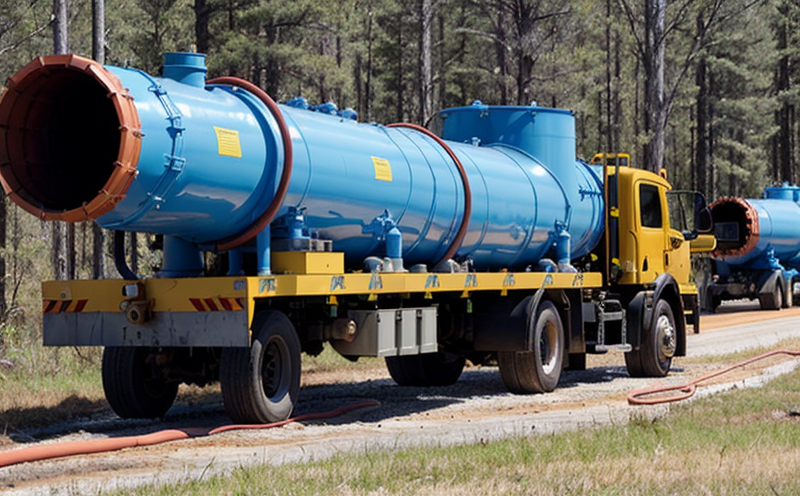ISO 15589-2 Cathodic Protection Testing for Offshore Gas Pipelines
ISO 15589-2 is an international standard that specifies the procedures for cathodic protection (CP) testing on offshore gas pipelines. This service ensures that pipelines remain protected against corrosion, which can lead to significant operational disruptions and safety hazards. The integrity of offshore gas pipelines is critical due to their extensive underwater and subsea environments where traditional inspection methods are challenging.
The standard focuses on the measurement of CP system performance parameters, including potential difference between the pipeline and reference electrode, current density distribution along the pipeline, and polarization resistance. This testing is essential for ensuring that the pipeline maintains an effective cathodic protection level, which prevents metal loss due to corrosion. The service involves detailed pre-test planning, field deployment, data collection, analysis, and reporting.
The offshore environment presents unique challenges. Pipelines are exposed to harsh marine conditions such as saltwater, high-pressure water jets, and temperature variations. These factors can influence the performance of CP systems, making regular and accurate testing critical for pipeline safety and longevity. The service adheres strictly to ISO 15589-2 guidelines to ensure that all tests are conducted under consistent and standardized conditions.
Pipeline integrity is not only about preventing corrosion but also ensuring that any potential issues are detected early. This proactive approach helps in minimizing downtime, reducing maintenance costs, and enhancing overall safety. By adhering to this standard, we provide a reliable assessment of the CP system's effectiveness, thereby safeguarding the pipeline against environmental stressors.
The testing process involves several key steps: initial site survey, reference electrode installation, data acquisition using specialized equipment such as CP testers, verification of test results, and comprehensive reporting. Each step is meticulously planned to ensure that all aspects of the CP system are evaluated accurately. The use of advanced technology ensures precise measurements and reliable data.
The benefits of this service extend beyond immediate safety improvements; it also supports long-term strategic planning for pipeline maintenance. By identifying potential weaknesses early, we can implement targeted interventions that prevent catastrophic failures. This approach aligns with broader industry goals of sustainability and operational efficiency.
- Enhanced safety through effective corrosion control
- Avoidance of unexpected disruptions to gas supply
- Reduction in maintenance costs due to proactive intervention
- Increase in pipeline operational life expectancy
The customer impact of this service is profound. It ensures that critical infrastructure remains reliable and safe, contributing to the overall resilience of power and utility systems. Compliance with international standards such as ISO 15589-2 also enhances a company's reputation for excellence in safety and environmental stewardship.
Why It Matters
The importance of cathodic protection testing cannot be overstated. Offshore gas pipelines are exposed to harsh marine environments, which can lead to rapid corrosion if not properly managed. Corrosion can cause structural weakening and ultimately failure, leading to significant financial losses and environmental damage.
Regular CP testing is essential for maintaining the integrity of these pipelines. By adhering strictly to ISO 15589-2 standards, we ensure that all tests are conducted under consistent and standardized conditions. This consistency is crucial for accurate measurement and reliable data interpretation.
The test results provide critical insights into the CP system's performance, allowing operators to identify areas of concern promptly. Early detection of issues can prevent minor problems from escalating into major failures, which could disrupt gas supply operations or pose safety risks.
Compliance with international standards not only ensures quality and reliability but also supports broader industry goals of sustainability and operational efficiency. By adhering to these standards, we contribute to the overall resilience of power and utility systems, ensuring that critical infrastructure remains reliable and safe for both operators and end-users.
Benefits
- Proactive detection of potential corrosion issues
- Enhanced safety through effective corrosion control
- Avoidance of unexpected disruptions to gas supply operations
- Reduction in maintenance costs due to timely intervention
- Increase in pipeline operational life expectancy
- Compliance with international standards ensuring reliability and accuracy
- Supports broader industry goals of sustainability and operational efficiency
The implementation of ISO 15589-2 cathodic protection testing ensures that offshore gas pipelines are maintained at optimal levels, thereby extending their service life and reducing the risk of failures. This approach aligns with the strategic objectives of power and utility providers to ensure reliable and safe operations.
Customer Impact and Satisfaction
The impact on customers is significant as this service ensures that critical infrastructure remains reliable and safe, contributing to overall operational resilience. By adhering to strict international standards, we enhance the safety and reliability of offshore gas pipelines, which are vital for sustaining energy supply chains.
Operators benefit from reduced maintenance costs due to proactive identification and resolution of potential issues before they escalate into major problems. This not only saves money but also minimizes downtime, ensuring continuous and efficient operations.
The service also contributes to environmental stewardship by preventing unnecessary disruptions that could lead to leaks or other hazards. By adhering to ISO 15589-2 guidelines, we ensure that all tests are conducted under consistent conditions, leading to accurate and reliable data interpretation.
Customer satisfaction is achieved through the provision of comprehensive reports detailing the test results and recommendations for maintaining effective CP systems. This transparency fosters trust between service providers and clients, reinforcing the reliability and safety of offshore gas pipelines.





